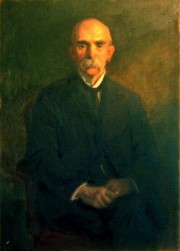 To George Herbert Palmer
To George Herbert Palmer
9 Avenue de l’Observatoire
Paris. August 2, 1912
I am busy giving the finishing touches to a book of essays on contemporary matters which is to appear shortly under the title: “Winds of Doctrine”. The California address will be in it, and there will be other things that may not be too wrong-headed not to be entertaining. My literary plans for the future are quite definite. I hope to produce three more books, besides the above. One is a short system of philosophy called :Three Realms of Being” (the three being Essence, Matter, and Consciousness) which will contain the correction of the misunderstanding to which “The Life of Reason” gave occasion, when some people took it for a system of the universe(!), which even my new book will not dream of being, and not merely for what it is; an account of the phases through which the human imagination may have passed in reaching its present posture. My second book is to be more laborious, and may not appear for many years, if at all in my lifetime. It is to be a critical history of philosophy, or rather a critical essay on the history of philosophy, on the plan that there is a thread of normal opinion, not unbroken yet traceable, from the Hindus on, and that a great number of heresies have branched off at this or that point, of which it will be interesting to analyse the nature and the plausibility. My third book—or books, since the subject is extensible ad infinitum—is a set of “Dialogues in Limbo”, of which three are written, in which criticism of modern ways and ideas is put into the mouth of Socrates and other ancient ghosts. This fancy is one in which I take great delight, and perhaps others may find such an exercise in self-criticism acceptable. With these projects (and some half-finished poetical plays left over from my younger days) I shall have enough to occupy my mind. For the rest, where I shall live, etc, it is a matter of less consequence. During some years I got on very well in America, and accomplished a good deal, though of very mixed quality, and tainted by the haste and want of solidity to which every thing invites one there; and I might have attempted to go on under the same conditions, except that the occasion for a change seemed to be marked, as it were, by Providence, and that the routine of lectures and the general tone of the place were wearing me out and getting on my nerves more and more. It seems as if with advancing years one’s nature asserts itself more markedly against one’s circumstances; and I never felt so much a foreigner in New England as I did of late. In Avila, where my two sisters are now, I have almost a home, and I was very happy in Madrid last winter, living with an old (female) friend, who is all piety, patriotism, and affection running over for everybody. She and her servants made me very comfortable; but I stipulated for a study to myself and perfect freedom, and got both. I expect to return there this next winter, with my unmarried sister; and that, with my other sister’s house in Avila, will doubtless remain my places of refuge, when I need a refuge. For the present, however, I am still eager for travel and variety of scene. At the end of August I am going to England, and think of spending the October term at Cambridge in order chiefly to talk over the “Three Realms of Being” with Russell and Moore, whose views are near enough to mine to be stimulating to me, while the fact that they live in an atmosphere of controversy (which for myself I hate) renders them keenly alive to all sorts of objections and pitfalls which I need to be warned of, in my rather solitary and unchecked reasonings.
You are very good to offer me the hospitalities of Quincy Street, and if I am ever in Cambridge, Mass. again, I shall certainly make your house my first Mecca. You may not remember it, but it was your encouragement and advice that decided me to go on with philosophy, instead of architecture, which I had thought of first as a profession. Your personality, with that of my other Harvard teachers and colleagues, must naturally always loom large in my memory, and remain one of the chief influences and points of reference in my intellectual life. Of course, we were divided by many things; but those which united us were perhaps, on the whole, more fundamental and important. They would doubtless seem so to a remote observer, and to ourselves in the end.
From The Letters of George Santayana: Book Two, 1910-1920. Cambridge, MA: The MIT Press, 2001.
Location of manuscript: Wellesley College Library, Wellesley MA
